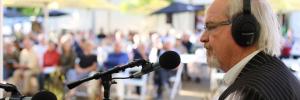
Woordfees discussions address topical issues
Discourse sessions are traditionally an integral part of SU's Woordfees, but in 2016, with all its challenges, they are of the utmost importance to all South Africans.
The Vriende van Afrikaans/ATKV debate on whether a developing country such as South Africa can afford multilingualism, confirmed that although multilingualism changes perceptions, very little has been done by government to encourage the use of all its official languages. With the 2015 education policy instructing schools to implement mother-tongue education up to Grade 6, learners will now be able to tackle other languages with confidence.
At the same discussion, Prof Mamokgethi Phakeng, Vice-Principal of Research and Innovation at Unisa, said language is a political instrument used by students to attack white privilege. "Inequality is mirrored in language," she said, explaining that when defending a language, in this case Afrikaans, the perception is created that one chooses to maintain inequality.
In the USB-ED debate on nation building and a shared history on the RSG programme Praat Saam, presented by Max du Preez, well-known philosopher Prof Willie Esterhuyse, vehemently denied that Afrikaans is a language of oppression, but warned that if black anger is not addressed, symbols become triggers for this anger.
Dr Ernest Messina, vice-president of the AHI, however, confirmed that great effort has been made to find shared symbols such as the flag and motto, and that there are many examples of races reaching out to each other. Prof Arnold Smit of USB-ED, warned against stereotyping people, but encouraged the haves not to wait for the government, but to reach out to the have-nots.
In the Beste Professor series, in which several SU academics participate, Prof Andreas van Wyk challenged Prof Willie Breytenbach, an expert on African affairs, on whether democracy and a legal state are viable in Africa. According to Breytenbach, apart from coups d'état, there is increasing evidence of "presidentialism", where a president runs for more than two terms, eventually becoming a lifelong president who rules like a king.
South Africa, however, is fortunate to have a free media, religious tolerance and a very active and well-organised civil society with unions, churches and ratepayers' associations to counteract such tendencies.
In the next few days you can look forward to a wide selection of stimulating discussions and debates. Just announced, is a not-to-be-missed discussion that Henry Jeffrey, previous editor of Die Burger, will lead with the rectors of several universities, among them SU Rector, Prof Wim de Villiers, on 10 March at 19:00 at the Khaya.
The Beste Professor series will be tackling topics such as land reform, South Africa and the world economy and the state treasury, Dave Pepler will lead scientific debates at the Science Café Stellenbosch, the Woordeboek van die Afrikaanse Taal will be discussing aspects of the WAT, and in Praat Saam, Africa and poverty, and how the Western world view will be affected by the migration of people, are some of the issues up for debate.
- For more information, visit www.woordfees.co.za
CAPTION: Max du Preez on Praat Saam. Photo by: STEFAN ELS
